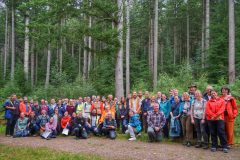Applied Tree and Forest Biology
JOIN AAB / RENEW
WHY JOIN AAB?
The Applied Tree and Forest Biology group was initiated in March 2022 as a follow-up to the AAB-organised ‘Trees for the Future’ event that took place at the University of Birmingham in November 2021.
The primary objective of the group is to narrow the gap between researchers and practitioners so as to facilitate the movement of new findings into practice.
We look forward to collaborating with other organisations to arrange events that would provide a new focus to the tree and forest biology communities.
The group recently organised the ‘Creating Canopies II‘ meeting in Carlisle in September 2025, which included a lovely walk at Coombs Wood.

Group Convener

Amanda Rasmussen
Amanda.rasmussen@nottingham.ac.uk
Amanda is an assistant professor at the University of Nottingham, known for her research on adventitious rooting – particularly in cutting propagation. Currently working with industry and government funding, her research explores the hormone networks and environmental factors that control propagation success in woody species. The overall goal is to increase genetic and species diversity in tree propagation programs while improving long term tree resilience to diverse stresses.
Group Members

Harry Studholme
I am a forester and farmer in Devon, owning and running the Perridge Estate near Exeter, an Honorary Fellow of the Institute of Chartered Foresters and an Honorary Professor at the University of Exeter. Between January 2013 to February 2020, I was Chairman of the Forestry Commission. I was Deputy Chairman of the Independent Panel on Forestry, which reported on the future of English forestry in July 2012. Between 2011 and 2017 I chaired the Phaunos Timber Fund a FTSE quoted international forestry Investment Trust.
I am currently the Chairman of Adapt Biogas an Anaerobic Digestion Group and a Fellow of the Institute of Chartered Accountants. The Perridge Estate was the joint winner of the All England Woodland Resilience Award for existing woodland in 2021.

Diana Vinchira-Villarraga
d.vinchira-villarraga@bham.ac.uk
Diana Vinchira-Villarraga is a postdoctoral Research fellow at the University of Birmingham (School of Biosciences). Her primary areas of research include the study of plant-pathogen and plant-beneficial microbe interactions using untargeted metabolomics, the development of biocontrol agents for crop plants, and the investigation of natural products, particularly antimicrobials produced by bacteria and plants that can be utilised against plant pathogens. Currently, her research has focused on understanding the response of trees to biotic (drought) and abiotic (bacterial pathogens) stress factors under glasshouse and field conditions using untargeted metabolomics

Elizabeth Orton
I’m a post-doctoral researcher in plant pathology with a particular interest in tree diseases. I currently work at the John Innes Centre and have previously worked in both the UK and New Zealand on forest pathogens, particularly new and emerging diseases. I am currently involved in projects to revive both ash and elm populations in the UK.

Elisabeth Larsen
elisabeth.larsen@forestresearch.gov.uk
I am a scientist in Forest Ecology at Forest Research in Alice Holt, having recently completed postodoctoral research at RHS. I did my PhD in forest hydrology in Valencia, studying the effect of hot droughts on forest transpiration- and the effect of Aleppo pine forests on local hydrology. Her current research focus is on ecosystem services provided by garden trees. This research includes flood mitigation potential, thermal regulation and carbon storage. She is interested in how trees can buffer adverse effects of climate change and dense urban infrastructure.

Ted Wilson
ted.wilson@silviculture.org.uk
Ted is a silviculturist with interests in tree biology, silvicultural systems and forest conservation. His work is mostly dedicated to applied research and knowledge transfer. His current focus is the transformation of conifer plantations to continuous cover forestry (CCF), using close-to-nature management principles, with projects in Ireland, Canada and the UK.

Gareth Thomas
I currently work in the DEFRA Tree Health policy team after a post-doctoral research at Rothamsted Research, working on acute oak decline; a disease caused by several pathogenic bacteria which poses a threat to oak trees. The aim of my research is to determine the role of microbial volatile organic compounds produced by these pathogenic bacteria in the behaviour of A. biguttatus, which could enable the identification of attractive microbial volatiles, to optimise semiochemical based strategies to monitor the spread of the disease across U.K. forests. My main research interests are microbiology, chemical ecology and entomology.

Nick Covarr
Forestry and woodlands lecturer and consultant at Harper Adams University. Spent the previous decade working for RSPB and Forestry England managing ancient woodland and commercial plantations from planting to harvesting. Interests include: Forest production – planting, tending, thinning, harvesting, marketing. Forest environment – biodiversity, water, soils, carbon capture. Forest recreation provision.

Andrew Hirons
Andrew is a Senior Lecturer in Arboriculture and Urban Forestry at University Centre Myerscough, UK. He is passionate about bringing science into tree management, particularly in urban areas. His research is motivated by the need to create resilient treescapes and focuses on tree selection in urban environments; this allows him to pursue his interested in tree water relations and stress physiology. Andrew co-authored the book Applied Tree Biology and has contributed to a wide range of other industry and academic publications.
